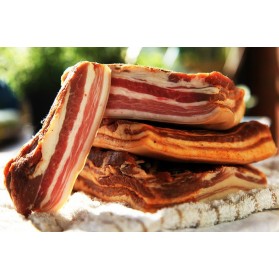No products
Prices are tax excluded
Slanina
There is 1 product.Slanina from Poland, Polish food deli store
Slanina is a word for fatback in Czech and Slovak languages. And what almost everybody knows is a cut of meat from a domestic pig. In particular, it remains the subcutaneous fat that the butcher obtains from the pig's back. Back of the torso, and flanks, with or without skin. A pig is an animal that has been accompanying Europeans for centuries. Undoubtedly, this is why Romanians, Hungarians, or Poles have mastered the art of breeding and preparing all parts of its flesh. They produce Slanina in many ways. Indeed, it may be raw, salted, grounded, smoked, stewed, or even canned. In Eastern and Central Europe, it is always a highly valued delicacy. Customarily, the inhabitants use this cut to make delicious lard. With greaves, it is a common element of the sandwiches in Poland, Hungary, and Czech. Both fat and Homestyle Lard are also traditional medicines of animal origin out there.
Wholesome Slanina from Europe. Perfect taste and no artificial additions
Slanina is tremendously caloric and fatty. Without a doubt, this is why many avoid it. And also because it is a real treasure chest of saturated, non-healthy fats. However, all of them (including saturated ones) provide the body with a concentrated form of energy. They also play an underestimated role in delivering the vitamins A, D, E, and K soluble in them. Palmitic acid present in the lard also regulates the secretion of hormones. Despite these facts, we should responsibly consume this caloric delicacy. Smoked Bacon, Pork Fatback, and Polish Lard should present on our tables only on special occasions. It is because they contain almost no polyunsaturated fatty acids that protect against heart attacks and strokes. Luckily, the European versions are much healthier and with no artificial preservatives. Besides, they do not contain any bone chips, signs of rancidity (yellow color), and other impurities. And their smell is perfect and specific for pure pork fats.
Healthy and wholesome food from Poland
If you are looking for a bold concentration of aromas in one product, smoked fatback will undoubtedly appeal to you! It is an excellent addition, especially to dry rubs and other pork meats. You can use it, for example, when roasting pork loin or sirloin. It will also go well on a sandwich. In particular, the one made with freshly baked bread. Smoked bacon is a perfect gift for someone who appreciates unique, traditional flavors. It is not all, however. Eaten reasonably, it can be an attractive supplement even to a diet. Above all, it is a solid energy source, which the human body eagerly will utilize. In addition, smoked lard increases the absorption of fat-soluble nutrients, including vitamins A, D, E, and K. Moreover, Slanina also contains palmitic acid, which is necessary for the production of hormones. Without a doubt, it is worth appearing on your table as a frequent and wholesome element.
An online shop with a fine selection of European food and fast shipping
Lard is a desirable product in Eastern Europe. In Poland, Ukraine, Belarus, and Russia in particular. Indeed, many people in these countries usually eat sandwiches with it. They consume fatback in every possible form: salted, smoked, or stewed. By sourcing it from healthy pig farms, they can be sure it will be aromatic and tasty. And wholesome as well. Because, apart from pork fat and salt, you will not find anything else in it. No artificial additives and taste improvers. These are utterly natural products. Are these sufficient arguments to order it from us? For us, decidedly! Especially that thanks to our online service they can be at your place even the next day. We are a company that imports healthy and wholesome products from Europe for you. In our online store, you will find an essential selection of local foods. These are the delicacies that people from the Old Continent eat with taste each day. If you order them from us right now, you can enjoy them shortly.
Popular dishes using European pork fat
Undeniably, you can prepare Romanian Slanina in a thousand ways. Europeans use it primarily to make aromatic lards, potato dumplings, gnocchi, and stuffed potatoes. They also make stuffed cabbage rolls, meatballs, pâtés, sour soups, and red borscht with potatoes from it. Besides, Slanina can be a source of tasty snacks too. These can be, for example, spicy cakes with cracklings and homemade preserves. Some also like to eat it raw. It tastes very good with salt or smoked paprika, to mention a few. However, we have to remember that it is a high-calorie product. It also contains a lot of cholesterol. It is, admittedly, necessary for the construction of the body. However, a too high level of cholesterol hurts our bodies. For this fact, we recommend consuming this treat in reasonable amounts. If you limit yourself to small portions every few days, you can enjoy its taste without any problems.
A specific delicacy for real gourmets
We recommend this treat made from subcutaneous pig tissue to real foodies. If you like the taste of animal products and fats, you can add Slanina to practically anything. And the taste of it will always benefit. This product is beloved in Eastern Europe and Russia. There, it is often a kind of appetizer for vodka. But the people of those regions also appreciate the richness of the fats and vitamins it provides. It is also part of the culture according to which we should utilize every animal piece. In hard times, it was the basis of sustenance. There are regions in Europe where it is even added to donuts! Today, however, it is a delicacy for a select few. Of course, nothing is stopping you from including yourself. All you have to do is order this item from our offer and prepare it according to one of the thousands of recipes.

